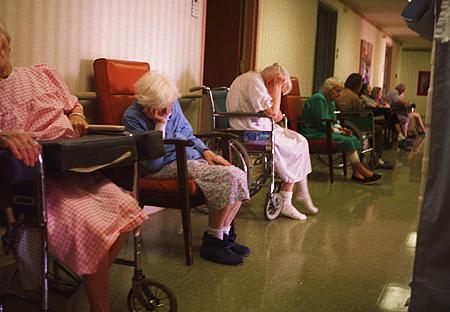
According to the National Center on Elder Abuse (NCEA), half of the nursing homes in the Unites States are understaffed. As a result, these nursing homes are unable to meet the demands of their residents and successfully maintain the facilities. Unfortunately, overworked employees and understaffed nursing homes can lead to abuse and neglect, which continues to be a serious problem across the nation.
If you suspect that a loved one has been injuredas a result of the nursing home negligence or abuse, contact our nursing home negligence attorneys for a FREE INITIAL CONSULTATION 1 (866) 863-3238.
BEDSORES CAN CAUSE SERIOUS PERMANENT INJURY OR DEATH
Bedsores or Pressureulcers are caused by sustained pressure being placed on aparticular part of the body.
This pressureinterrupts the blood supply to the affected area of skin. Blood contains oxygenand other nutrients that are needed to help keep tissue healthy. Without aconstant blood supply, tissue is damaged and will eventually die.
The lack of bloodsupply also means that the skin no longer receives infection-fighting whiteblood cells. Once an ulcer has developed, bacteria can infect it.
People with normalmobility do not develop pressure ulcers, as their body automatically makeshundreds of regular movements that prevent pressure building up on any part oftheir body.
For example, while youare asleep you may think you are lying still, but you may shift position up to20 times a night.
Pressure ulcers can becaused by:
· pressure from a hard surface, such as a bed or wheelchair
· pressure that is placed on the skin through involuntary muscle movements,such as muscle spasms
· moisture, which can break down the outer layer of the skin(epidermis)
The time it takes fora pressure ulcer to form will depend on:
· the amount of pressure
· how vulnerable a person's skin is to damage
Grade three or four pressureulcers can develop over short time periods. For example, in susceptible people,a full-thickness pressure ulcer can sometimes develop in just one or two hours.However, in some cases the damage will only become apparent a few days afterthe injury has occurred.
Increased risk
There are severalfactors that increase the risk of developing pressure ulcers. Theseinclude:
· mobility problems – anythingthat affects your ability to move some or all of your body
· poor nutrition – foryour skin to remain healthy, it requires nutrients that can only be supplied byeating a nutritious diet
· an underlying health condition that disrupts your blood supply or makes your skin more vulnerable to injury and damage
· being over 70 years old
· urinary incontinence and/or bowel incontinence
· serious mental health conditions
Mobility problems
Possible reasons forhaving a mobility problem are:
· having a spinal cord injury that causes some or all of yourlimbs to be paralysed
· brain damage caused by an event such as a stroke or severe head injury ,which results in paralysis
· having a condition that is causing progressive damage to thenerves your body uses to move parts of the body, such as Alzheimer's disease , multiple sclerosis or Parkinson's disease
· having severe pain that makes it difficult to move some or allof your body
· having a fractured or broken bone
· recovering from the effects of surgery
· being in a coma
· having a condition that makes it difficult to move yourjoints and bones, such as rheumatoid arthritis
Poor nutrition
Reasons that your dietmay lack nutrition include:
· anorexia nervosa – amental health condition where a person has an unhealthy obsession with maintaining a low body weight
· dehydration – youdo not have enough fluids in your body
· dysphagia – difficultyswallowing food
Health conditions
Health conditions thatcan make you more vulnerable to pressure ulcers include:
· type 1 diabetes and type 2 diabetes – thehigh levels of blood sugar associated with diabetes can disrupt normal bloodflow
· peripheral arterial disease – the blood supply in the legs becomes restricted dueto a build-up of fatty substances in the arteries of the legs
· heart failure – previousdamage to the heart means it is no longer able to pump enough blood around thebody
· kidney failure – thekidney loses most or all of its functions, which can lead to a build-up of dangerous toxins (poisons) in the blood that can cause tissue damage
· chronic obstructive pulmonary disease (COPD) – a collection of lung diseases; the low levels of oxygenin the blood associated with COPD can make the skin more vulnerable to damage
Ageing skin
There are severalreasons why ageing skin is more vulnerable to pressure ulcers. These include:
· with age, the skin loses some of its elasticity (stretchiness),which makes it more vulnerable to damage
· reduced blood flow to the skin because of the effectsof ageing
· the amount of fat under the skin tends to decrease as people getolder
Incontinence
Both urinaryincontinence (inability to control your bladder) and bowel incontinence(inability to control your bowels) can cause certain areas of the skin to becomemoist and vulnerable to infection. This can trigger pressure ulcers to form.
Mental health conditions
People with severemental health conditions such as schizophrenia (a conditionwhere people have problems telling the difference between reality andimagination) or severe depression have an increased risk of pressure ulcers fora number of reasons:
· their diet tends to be poor
· they often have other physical health conditions, such asdiabetes or incontinence
· they may neglect their personal hygiene, making their skin morevulnerable to injury and infection
http://www.nhs.uk/Conditions/Pressure-ulcers/Pages/Causes.aspx